Introduction
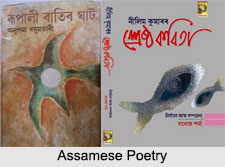 Assamese Poetry is the poetry of Indian Literature composed in Assamese language. It borrows many themes from Sanskrit literature, the fountainhead of most of the Indian literature. The Assamese Poetry is mainly devotional in tone. The origin of Assamese poetry is considered to have taken place in the early 13th Century. Bhagavad Purana was the first adaptation in the history of Assamese Literature.
Assamese Poetry is the poetry of Indian Literature composed in Assamese language. It borrows many themes from Sanskrit literature, the fountainhead of most of the Indian literature. The Assamese Poetry is mainly devotional in tone. The origin of Assamese poetry is considered to have taken place in the early 13th Century. Bhagavad Purana was the first adaptation in the history of Assamese Literature.
History of Assamese Poetry
Sanskrit literature has inspired many writers of modern Assamese literature to undertake creative writings in the context of modern literary trends and styles. Assamese Literature starting with poetry in Sanskrit was mainly devotional in tone and tenor. Since all the adaptations are being rooted in Sanskrit. The starting of Assamese Poetry is marked with the adaptation from Sanskrit puranas into Assamese by the poet-scholar Hema Saraswati in the early 13th century. His first adaptation was "Prahlad Charita" adapted from Vamana Purana.
Development of Assamese Poetry
Development of Assamese Poetry occurred as result of the various changes that happened in Assam. In Assamese, as in other languages, poetry was the earliest medium of expression. No wonder, therefore, that the new spirit of romanticism also found its earliest articulation in verse. The developed Assamese poetry cradled on the wheels of modernity breeding the postcolonial hangovers and the maroons of individualistic strains.
Factors that led to the development of Assamese poetry
When Modernity arrived as a postcolonial intervention in the tradition bound Assamese society in the wake of the British occupation of Assam in the nineteenth century, it found an intellectual vacuum to fill in. Before the British came, the society itself was in disarray following the decline of the six hundred year Ahom rule and the oppressive invasion of the Burmese. The literature was in a moribund state slowly declining after reaching a great height during the neo-Vaishnavite period in the sixteenth century. Modernity, which was the manifestation of the western rational thought that saw great industrial progress, found this vacuum well-suited to bring in new impulses.
But there was still an unbroken continuity of lyric impulse in our folk life and its feeding fount was nature. Though rational thought became the guiding light in matters of societal progress, it was romanticism with the foregrounding of imagination that attracted the Assamese poetic mind. Romantic impulses blended creatively there with the pre-existing lyric sediments giving form to the new Assamese literature. By the forties of the 20th century however, perceptions of the new poets started changing.
The Second World War impacted the world in a decisive way. Market centers started developing into urban conglomerations causing movements of people from the villages to such centers, illicit trading of goods became a new phenomenon and even flesh trade proliferated. Besides, the gap between the comparatively well-to-do and the poor became more pronounced and overall, a harsh social reality impacted the tranquil life of a society that was comfortably adjusting its life to the changes brought about by a slow-paced modernity. After India`s independence, the problem arising out of the issue of the state`s official language, the gaps occurring between social expectations and the slow pace of economic development, the rise of unemployment accentuated by the failure of the economy to create proper job opportunities for a growing educated population that harboured middle class dreams of upward mobility etc. created a sense of modern uncertainty in the society. An awareness of social class division also came to the fore. In this scenario, a new poetry had to spring up, particularly since romantic poetry lost its vigour and expressiveness through repetitions of themes and diction and soporific rhyme schema. The principal practitioners of this kind of poetry also started becoming silent, some of them being snatched away by death and the others bewildered by the uncertain changes taking place around them.
Spread of Assamese Poetry
As a result of the spread of the western system of education and the consequent impact of western ideas on the minds of the people, Assamese poetry underwent radical changes in both form and content. Assamese literature was influenced by the Romantic Revival in England, and the result was a new and unprecedented florescence of Assamese literature, rich and varied, vital and vigorous. The old and narrow outlook yielded place to catholicity, formalism to a variety of attractive and new patterns. There were innovations in diction, rhythm and imagery, potent instruments of poetic consciousness, and what emerged from these innovations was something novel, invigorating, powerful and brilliant. Assamese poetry entered into a romantic period of large and lofty dreams of Utopias and El Dorados, daring hopes and sky scraping aspirations. The new poetry sang of freedom for all from political dependence, social injustice, religious bigotry, of the dignity of the individual, and of the unity of the nation.
This is pre-eminently true of modern Assamese poetry over which the influence of the English Romantic Revival was doubtless very wholesome. Its love of beauty developed in the Assamese poets a fuller appreciation of the scenic grandeur of their country. Similarly, its interest in antiquity imbued the Assamese poets with a deeper understanding and a more intense love of the national heritage.
Poets who contributed in development of Assamese Poetry
A leading poet of this new movement was Kamalakanta Bhattacharya (1858-1936). In the poetry of Kamalakanta Bhattacharya there is the triple strand of the patriot, philosopher and social reformer. For the first time in Assamese literature, he sounded the clarion call of liberal patriotism. Chandrakumar Agarwala (1867-1938) is another votary at the shrine of Beauty. His poetry breathes a love of beauty, a joy in living and a spirit of optimism, issuing forth from a warm, sympathetic and tender heart. While older poets believed beauty to dwell in the ambrosial bliss of the heaven of the hereafter modern poets discover the same beauty in the heart of Nature. Ananda Chandra Agarwala (1874-1940) translated poems from English which read like the original. He also wrote several narrative poems of absorbing interest based on folk-tales. Hiteswar Barbarua (1876-1939) wrote long narrative poems in blank verse and a number of sonnets, modeled after English types. Raghunath Chaudhari is (1879- ) known as the bird-poet of Assam. His very first collection of poems, Sadari (The Darling), shows a preference on the part of the poet for birds, flowers and gardens. Another literary stalwart of the 19th century was Hemchandra Barua (1835-96), who has rightly been called the father of modern Assamese language and literature. He brought great devotion to his work coupled with organisation, assiduity and diligence. His Grammar of the Assamese Language (1856) and Hemkos (Dictionary), the first standard work on lexicography, laid a sure foundation for the future development of the language.
Assamese Poetry in Jayanti Era
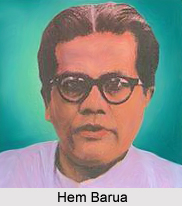 Assamese poetry in Jayanti era shows a sharp divergence from the optimism of the earlier period. Writers challenged the established norms and contentment of a society based on caste and class distinctions. Their poetry reflects a disillusionment and cynicism that stemmed from the knowledge that a free, modern India did not imply freedom and equality. Progress, technological and industrial, was felt to be doubtful if it ignored the concerns of a large part of society.
Assamese poetry in Jayanti era shows a sharp divergence from the optimism of the earlier period. Writers challenged the established norms and contentment of a society based on caste and class distinctions. Their poetry reflects a disillusionment and cynicism that stemmed from the knowledge that a free, modern India did not imply freedom and equality. Progress, technological and industrial, was felt to be doubtful if it ignored the concerns of a large part of society.
Among the poets of this generation, Amulya Barua (1922-46) was the foremost. His "An-dharor Hahakar" (The Tumult of Darkness) is a brilliant anti-romantic poem. It evokes the traditional Romantic image of an autumnal, moonlit night to have it reveal horror, death, and decay. His "Beisya" (The Prostitute) is a controversial poem that points contemptuously to the upper echelons of society who are united with the prostitute in a single act that they publicly scorn but privately practice. Where the prostitute`s behaviour arises out of dire need, the behaviour of the men is shown to be self-indulgent and thus more contemptible. In a similar vein, in Keshav Manama`s (1926) "Suror Koiphiyot" (The Thief`s Justification), which appeared in the first issue of Jayanti`s important seventh year, the protagonist, a thief, points at social conditions as being responsible for the path he must take. In the second issue of that year, Amulya Barua`s "Biplobi" (Revolutionary) explains the modern revolutionary vision, a vision that was not oppositional but sought ideological reforms through knowledge and tolerance. It was a bitter irony that the ignorance, intolerance and social divisiveness that Amulya Barua spoke out against were the cause of his death in the communal riots in Kolkata during partition. In the same issue of Jayanti, Hem Barua`s "Guwahati-1944" described the state of the nation as one crowded with wartime difficulties and political and ideological struggles.
The language of this poetry was immediate, accessible and extremely forceful. Its tone was questioning, probing, revealing. Among the notable poets of this period were Prasannalal Choudhuri, Shashikanta Gogoi, Bhaba Prasad Rajkhowa, Said Abdul Malik, Narayan Bezbarua, Mahesh Deb Goswami, Maheswar Neog, and Deva Kanta Barua, some of whom are still writing. It would be inaccurate to call all these poets anti-romantic, as many of them still leaned toward the earlier Romantics. But poetry in general showed the influence of English poets such as Yeats, Pound, and Elliot, and this modern poetry was the dominant one.
Assamese Poetry in Jonaki Era
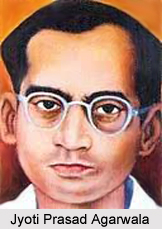 Assamese poetry in Jonaki era was very much in keeping with the theme of Romanticism of the time. In the case of poetry, even as the conditions of the modern world forced poets to turn to realism and naturalism and adopt a cynical attitude toward man and society, the romantic vision continued to manifest itself in the works of numerous poets who had grown up in the first two decades of the twentieth century. Some of the most significant poets and their works are discussed below.
Assamese poetry in Jonaki era was very much in keeping with the theme of Romanticism of the time. In the case of poetry, even as the conditions of the modern world forced poets to turn to realism and naturalism and adopt a cynical attitude toward man and society, the romantic vision continued to manifest itself in the works of numerous poets who had grown up in the first two decades of the twentieth century. Some of the most significant poets and their works are discussed below.
Chandrakumar Agarwala`s poems, published first in Jonaki and collected later in Pratima (Image, 1913) and Bin Boragi (The Wandering Bard, 1923), best exemplify the Romantic ideal of the poetry of this age. His poem ` `Niyor`` (The Dewdrop) looks at a single drop of dew and, in describing it, evokes an intense longing to discover its origins and the meaning of its beauty. The small drop of dew speaks volumes to the poet, who imagines it to be a pearl dropped from the ornaments of a girl dancing amid the flowers at night or perhaps her tear shed at the sight of sunrise. Poems like this display a Keatsian gaze at an object of beauty.
Agarwala`s poems like `Manav Bandana` (Worship of Humanity) and `Bin Boragi` glorify man as a reflection of the Supreme Being and are reminiscent of the search for the sublime in eighteenth and nineteenth-century English literature. This search for the sublime and the beautiful is found in a long line of poets following Chandrakumar Agarwala.
In his contemporary Hemchandra Goswami`s sonnet `Priyatamar Sithi` (My Beloved`s Letter), the first Assamese sonnet, an examination of poetry and nature is woven into the description of the letter itself. Lakshminath Bezbarua brought simplicity to the Romantic tradition through poems such as `Basanta` (Spring) and his `Bin Boragi.` But beyond that, Bezbarua revived Assam`s existing folk-song tradition through his ballads and pastorals. In his poems, too, we find a patriotic idealism and optimism about Assam past and present and its potential. His `O Mor Aponar Desh` (My Dearest Country) displays an intense pride in his place of birth and has become the state`s anthem. Whereas these poets used the simple rhyme schemes and meter typical of the lyric, other Romantic poets used blank verse, too. Padmanath Gohain Barua`s poems in his Juroni (1900) utilize the blank verse form of the much earlier classical kavyas (or verses).
Notable among the early twentieth-century poets who first published in Jonaki were Raghunath Choudhari (1879-1968), who was also known as bihogi-kabi, or bird-poet, for his numerous poems with birds as the central character in nature and whose first collection of poems, Sadori, was published in 1910; Bholanath Das (1858-1929), whose poetic contribution preceded Jonaki; and Anandachandra Agarwala (1874-1939), who translated numerous English and American poems and whose collection of original poems, Jilikoni (Glittering), was published in 1920.
Though Romantic poetry was written well into the 1950s and 1960s, this poetry was also contemporaneous in that it included the concerns of a newly independent country. Among the poets of this continuing stream of Romanticism were Ambikagiri Raichoudhuri (1885-1967), whose first collected poems were Tumi (You, 1915) and who brought a revolutionary ideal to all his works; Jatindranath Duara (1892-1968), whose translation of Omar Khayyam`s `Rubaiyat` was a brilliant example of this genre; Parvati Prasad Baruva (1904-64), who, from his first poetic drama Lakhimi (1931) and through his poems and songs, expressed the eternal search for the sublime through contemplation of simple things in nature; and Jyoti Prasad Agarwala (1903-51), whose poetry was but part of a prolific body of works that enriched Assamese literature immeasurably. The influence of the Jonaki era`s Romanticism was far-reaching and is still felt today.
Assamese Poetry in Post Jonaki Era
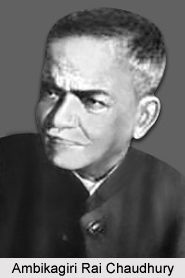 Assamese Poetry in Post Jonaki Era witnessed the emergence of many poets who produced explicit creations. Assam majestically conjures before mortal eyes an ideal idea of duality: on one hand the lust green tea gardens and on the other hand ceaseless ethnic strife. The modernity in Assam; introduced by the British clan is one of Colonial modernity which instigated several cultural and political projects in the region such as the politics of identity formation. Jonaki era in literature of Assam points towards these juxtapositions owing to the fact that art imitates life and poetry as well as literature reflects society. The tumults, the events, the colours of the moments of agitation are recorded; not through the focal point of the dewy glasses of history but with an empathetic worldview to understand, to interpret, to drown in the abysmal depths in order to hit the bulls eye. Yet the poet worships the nature, glorifies mother earth, ushering in the affluence of a new era as the Jonaki (firefly) cult enlightens the poetic plethora, like a mystic polestar amidst the stormy horizons of Assam.
Assamese Poetry in Post Jonaki Era witnessed the emergence of many poets who produced explicit creations. Assam majestically conjures before mortal eyes an ideal idea of duality: on one hand the lust green tea gardens and on the other hand ceaseless ethnic strife. The modernity in Assam; introduced by the British clan is one of Colonial modernity which instigated several cultural and political projects in the region such as the politics of identity formation. Jonaki era in literature of Assam points towards these juxtapositions owing to the fact that art imitates life and poetry as well as literature reflects society. The tumults, the events, the colours of the moments of agitation are recorded; not through the focal point of the dewy glasses of history but with an empathetic worldview to understand, to interpret, to drown in the abysmal depths in order to hit the bulls eye. Yet the poet worships the nature, glorifies mother earth, ushering in the affluence of a new era as the Jonaki (firefly) cult enlightens the poetic plethora, like a mystic polestar amidst the stormy horizons of Assam.
Raghu Chaudhury had expressed many moods and sensations and found most fitting words to express them have succeeded in broadening the range of Assamese poetry. Chaudhury is a poet of joy who calls upon nature, birds and flowers to share human delight and contribute to it the essence of pantheism. The poems Ketaki and Dahikatara are written in perfect joyous mood. In Bahagir biya, the poet is in an ecstatic mood over the prospect of spring the season of fruitfulness and joyous manifestations of exotic cornucopia. The essence of his nature poetry which is evident from Golap and Girirnallika, offers excessive joy. His naturalism is dictated by passion-oriented religion. The gleams of earth, sky, water and vegetation, the changes of season and the beauty of alternating landscape inspires his poetry. He has developed a distinctive literary style. His poetical works are Sadari (1910), Ketaki (1918), Karhala (1923) and Dahikatara (1931).
Ambikagiri Rai-Chaudhury`s poetry is vibrant with mystic and patriotic aspects. He owes much to his contact with the metaphysics and mysticism of The Gita and Vaishnava literature. Rai-Chaudhury`s Tumi opens with a deep description of the beloved`s body. While romantic mysticism invigorates his poetic endeavour, Chaudhury is even apt with his jingoistic zeal. He is an apostle of patriotism who instils courage into readers. His works are Anubhuti, Veen, Bandoki chhandare and Sthapan kar sthapan kar.
Jatin Duara (1892-1964) whose poetic career grew under the patronage of a journal called Banhi records emotional despair of angst ridden mortal life. He owes much to Shelley and Tennyson as to Omar Khayyam, Sufism and Rabindranath Tagore. Sunya parichoi is a confession of a man who makes the romantic soul an object of his analysis. In Duara`s nawaria group of poems his desire to drift with stream like a forlorn soul is visible. His doctrine of love is passionate. Duara is known for his melodious verse than for his sentiments. His famous publications include Omartirtha (1925), Apon sur (1938), Banaphul (1952), Milanasar sur (1960) and so on.
Nalini Devi is a mystical poet. There is a predominance of faith in her inspiration. She turns to the spiritual world for her themes. The central theme of Paramtrishna, one of her best poems, is immortality of the soul. Her poetry possesses a kind of symbolism. A ceaseless pining of the soul is the theme of her poem Sosa ne. Her poetry is noted for a spiritual absolutism.
Ratna Barkakati (1897-1963) was a poet of serene vision who never fumbled with ague imageries. His major works include Sewali (1932), Prakash badha, Taj Mahal. A pleasant quest and brightness of colour and sound are visible in his poems. He has a suggestive and restrained style. His love-poetry is above all aspiration and desire. Viswa-haran is one of his best love-lyrics. Tarpan is also one of his most important works.
Dr. S. K. Bhuyan (1894-1964) published his collection of poems Nirmali in 1918. In Saundarya, nature is portrayed as a maiden against the sky. Prakritir santan is a myth poetic description of a child reared in harmony with nature. In Sukhdukh, he renounces the pessimistic view of life. His other popular poems include Apon sur, Utala, Tipam deka, Asam gaurov.
Durgeswar Sarma is a poet of mystic and philosophic thought. Sarma`s collections of poems are called Anjali and Nivedan. Dandi Kalita, Rah-ghora, Ragar and Bahurupi are his other collections. These are satirical poems.
Dimbeswar Neog`s produced poems of great strength and beauty like Sapamukta. This poem presents a myth poetic conception of nature. Here the poet accepts the rejuvenation of nature as a symbol. Neog`s Maram bhikhari is a poem of idyllic beauty. His Mukuta is a collection of 14 sonnets. Neog`s other works are Malika (1922), Thupitara (1925), Malati (1927), Shahide Karbala (1940), Meghdut (1942), Bichitra, Thapana (1948) and so on.
Sailadhar Rajkhowa (1892-1968) is noted for spontaneity of thought. Besides Barpeta and Bisandoi ali, his Pasan pratima is a patriotic song of great appeal. It is considered as a war-poem. Rajkhowa`s Humar kasat is an apostrophe to "wedded love". It is a poem noted for its tribute to beauty.
Nilmani Phukan is a poet cum politician. He has imported into poetry the peculiar excellence of prose. His poems like Bhikahu, Dukhiram are full of passionate sympathy for socially oppressed people. Jyotikona is one of his famous collections of sonnets.
Many other poets whose contributions were noteworthy include Binanda Barua, Mitradev Mahanta, Atul Hazarika, Daiba Talukdar, Ananda Barua , J. P. Agarwalla , Padmadhar Chaliha, and Prasannalal Chaudhury , Gonesh Gogoi`s. Among other poets of the thirties and the mid- forties mention may be made of Sashi Gogoi, Bhabanath Hazarika, Bhabananda Rajkhowa, Dulal Barpujari ,Bhabaprasad Rajkhowa, Thaneswar Hazarika, M. N. Deka-Phukan and Deva Barua.
Modern Assamese Poetry
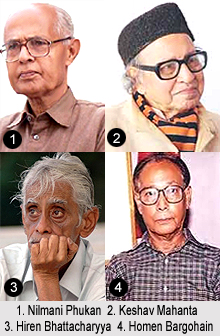 Modern Assamese Poetry is an annulment of real life of the people. Assamese poetry of the forties registered a fresh departure which was visible in technique and subject-matter of Assamese contemporary poetry. Political and social absorption was a new resurgence in Assamese Poetry that drew poets away from the world of romantic dreams into the world of realism. This new trend in Assamese literature made its appearance during the forties of this century under the patronage of a journal called Jayanti Era. This poetry was critical, socially conscious and anarchic in technique and subject-matter.
Modern Assamese Poetry is an annulment of real life of the people. Assamese poetry of the forties registered a fresh departure which was visible in technique and subject-matter of Assamese contemporary poetry. Political and social absorption was a new resurgence in Assamese Poetry that drew poets away from the world of romantic dreams into the world of realism. This new trend in Assamese literature made its appearance during the forties of this century under the patronage of a journal called Jayanti Era. This poetry was critical, socially conscious and anarchic in technique and subject-matter.
This technique adopted with a cynically satirical vein has been brought to bear devastatingly upon the hollowness and hypocrisies lying concealed in the modern civilization. The new poets` wide range of studies of the East and the West, of the ancient and the modern was laid under contribution and hence quotations and references abound in their poetry. These quotations may come from such widely different sources as European literature, the Upanisads, Vaisnavite literature, or the Assamese folk songs. Often, the romantic tradition of Assamese poetry is held up to ridicule. But the poets do all this with a more positive aim. They want to administer to the educated and cultured section of the readers an emotional shock as do the psychiatrist to the neurotic patients in order to restore their mental equilibrium. The poets` shock consists of paradoxical and astounding statements of known facts in a kind of telescopic language. But unfortunately, very often, these learning-ridden, cryptic sentences produce very little emotion in the common reader.
Amulya Barua (1922-46) produced some notable poems like Kukur, Vashya and so on. He was the most outstanding of this generation of poets. This progressive poetry can be called revolutionary as it renounced an old tradition and discovered new frontiers of poetry. It was addressed to a specific purpose. However it failed to emerge into a comprehensive literary attitude. In an industrially backward State like Assam where conditions emerging out of industrial complexes were non existent it was impossible to create poetry of "the chisel and the roller".
The attitude to life and problems of the Pachuwa Ramdhenu group of poets was more positive and comprehensive than that of the Jayanti group. It was a modern equivalent of "occasional verse. The Jayanti poets lacked passionate faith in the cause they were supposed to promote. Their poetry was propaganda. A modern poet is not selfish and confined to his own self-imposed limitations.
Naba Barua`s explored the subconscious and created poetry of a varied nature. His poetry is basically communication. Assamese poetry of the post-war period is free from psychological influence. The recent tendency in Assamese poetry is to make the objective more subjective and the subjective more objective. This interest has been stimulated by studies of Freud, Jung and Adler.
Symbolism, a French technique, was employed to explore the nominal world and discover meaning for the world of consciousness. Homen Bargohain, Mahendra Bora, Dinesh Goswami and Nilmani Phukan were interested in the sparkling of the human heart. The technique employed by all the three, except Bora was symbolist. However, this is the first authentic attempt to give Assamese poetry a new direction on the lines of French symbolist poetry.
The only poet of this generation who has held on to romantic poetry is Hari Barkataki. His poetry is romantic with a difference. This tendency was inherent in the poetry of Homen Bargohain, Mahendra Bora, Dinesh Goswami and Nilmani Phukan which marked a second wave of the romantic poetry. Notable Assamese poets of this generation are Keshav Mahanta, Nirmalprava Bardoloi, Bireswar Barua, Biren Barkataki, Sushil Sarma, Harekrishna Deka, Hiren Gohain, Nalini Bhatta, Bhagagiri Rai-Chaudhury, Gunabhi Chaudhury, Radhikamohan Bhagavati, Biren Bargohain, Hiren Bhatta, Ratna Oja, Amalendu Guha, Ravindra Bora, Saiduddin Ahmed, Anandeswar Sarma, Prafulla Bhuyan, Bhaben Barua and Benu Chiring.
Present-day Assamese poetry is marked by passion, music and precision. It is vibrant with a spirit of moral independence and social criticism. New values are on a rise. Assamese literature has produced good poets from the forties of this century to the present-day.
Assamese Poets
The Assamese Poets made poetry popular by presenting hard, concrete images to render the particulars exact and by avoiding vague generalities. They have drawn on images and symbols from the countryside, oral tradition and common experience. Nature and the countryside marginalised in the Assamese Poetry of the fifties. Some of the well-known Assamese Poets are as follows:
Nilmoni Phukan: Nilmani Phookan is an Assamese poet noted for his works that include "Surya Henu Nami Ahe Ei Nodiyedi", "Gulapi Jamur Lagna" and "Kobita".
Hiren Bhattacharyya: Hiren Bhattacharyya was one of the best known Assamese poet and lyricist. He had achieved many prizes and accolades for his poetry.
Nalinidhar Bhattacharya: Nalinidhar Bhattacharya was an Indian poet and literary critic from Assam. He was regarded as one of the important poets of the Jayanti era in Assamese literature.
Lakshminath Bezbaroa: Lakshminath Bezbaroa was a great Assamese personality and celebrated pioneer of modern Assamese literature. He was one of the literary stalwarts of the Jonaki Era in Assamese literature.



















